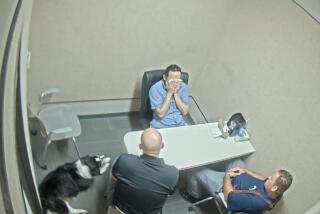Judge Rules Against Peyer Defense, OKs Blood-Test Evidence
- Share via
The defense strategy for Craig Peyer, the former California Highway Patrol Officer charged with murder, received two setbacks Thursday when a Superior Court judge ruled that sophisticated blood tests as well as testimony of 19 people whom Peyer stopped near the site of the killing can be used as evidence in his upcoming trial.
The blood tests and the testimony are both expected to strengthen the prosecution’s case against Peyer, who is charged with murder in the 1986 strangulation of San Diego State University student Cara Knott, 20.
The blood tests check for “genetic markers” that provide keys to identifying people who have similar blood.
A police blood expert testified at Peyer’s preliminary hearing in May that a “crusty” blood spot lifted from Knott’s left boot matched Peyer’s type-A blood. Knott’s blood was type-O, the police serologist said.
However, it was the testimony of blood experts in the field of genetic marking that proved more damaging to Peyer and prompted a move by defense attorneys Robert Grimes and Diane Campbell to prevent the experts from testifying at the trial scheduled to begin Jan. 4.
At issue is a complex test called “absorption inhibition” that identifies Gamma and Kappa markers (Gm and Km) in a person’s blood. The markers have unique identifying characteristics, and the more markers that can be tested in a bloodstain, the greater the probability of identifying the source of the blood sample.
In Peyer’s case, serologist Gary Harmor matched a bloodstain from Knott’s bloody sweat shirt to Peyer’s blood type. Harmor did not say that the blood spot came from Peyer, but testified that the Km and Gm lifted from the stain are found only in about 1% of the world’s population, and only in Caucasians.
The isolated stain could not have come from Knott, Harmor said.
Grimes and Campbell have argued repeatedly that the Km and Gm tests are “arcane and esoteric” and fail to meet the standard for scientific evidence used in California courts. Though the tests have been widely used in Europe since the early 1960s, such is not the case in the United States.
But Judge Richard Huffman said Peyer’s lawyers had failed to produce scientific experts to testify about the tests’ unreliability.
Prosecutors James Atkins and Joseph van Orshoven, however, produced an expert who testified that there is no disagreement in the scientific community over the tests. They presented research papers to back the expert’s testimony.
“The court is impressed. . . . There is no dissent and none has been presented (as evidence),” Huffman said. “ . . . Scientists have reached a consensus that this is a reliable method of testing for blood discrimination.”
Furthermore, Huffman said he was not persuaded by defense arguments that the tests should be excluded because they are seldom used in this country.
“There is limited use of Gm and Km markers in the United States, and that reason is not entirely clear to me,” Huffman said. “ . . . But the scientific community’s testing of blood, in my view, cannot be limited to the United States.”
Though Huffman allowed the Km and Gm tests to be introduced as evidence, he prohibited prosecutors from telling jurors that only 1% of the population shares the same blood markers as Peyer.
Defense attorneys objected that making this information available to the jury would greatly prejudice Peyer’s case, and argued that prosecutors have thus far failed to substantiate the experts’ claim. Huffman agreed, and ruled that he would not allow the 1% distribution statistic to be entered as evidence unless prosecutors can establish a sufficient foundation to allow its introduction.
Prosecutors are expected to present a mathematician who will testify about the distribution rate among the general population of people with Km and Gm similar to Peyer’s.
19 Witnesses Can Testify
In another controversial issue in the case, Huffman also ruled that 18 young women and one man who testified at Peyer’s preliminary hearing could testify at the trial. The 19 were stopped by Peyer at night in 1986 for minor traffic violations near Interstate 15 and the isolated Mercy Road off-ramp, where Knott was killed.
The 19 testified that they were forced by Peyer to drive to the darkened off-ramp, where he detained some of them for as long as an hour and 40 minutes. Though the women said they were never touched or threatened by Peyer, 37, they were concerned by the length of the stops, which Peyer’s CHP supervisors said were against departmental policy.
Peyer’s attorneys had called the witnesses’ testimony “irrelevant” and argued that the traffic stops had nothing in common with Knott’s death. Prosecutors countered that the stops showed a clear pattern of conduct on Peyer’s part and asked that the testimony be allowed. Prosecutors theorized that Knott was stopped because the light above the rear license plate of her Volkswagen was burned out.
Huffman sided with the prosecutors and ruled that the testimony of the women and man, who prosecutors said was mistaken by Peyer for a woman because of his long hair, was relevant to the facts of the case.
Peyer is charged with murdering Knott on Dec. 27, 1986, and is free on $1 million bail. Police said that Knott was strangled between 9 and 10 p.m. after struggling with Peyer. The woman was killed on a bridge near Interstate 15 and Mercy Road and her body was dropped 65 feet into a dry creek bed.
More to Read
Sign up for Essential California
The most important California stories and recommendations in your inbox every morning.
You may occasionally receive promotional content from the Los Angeles Times.













